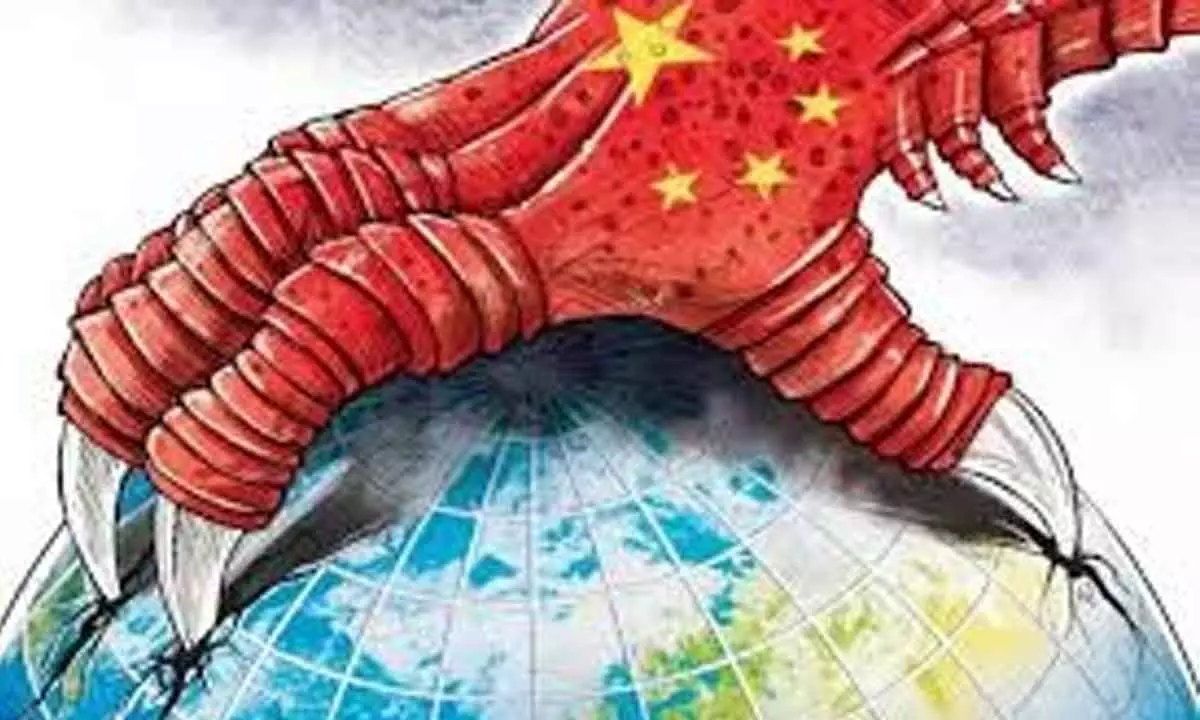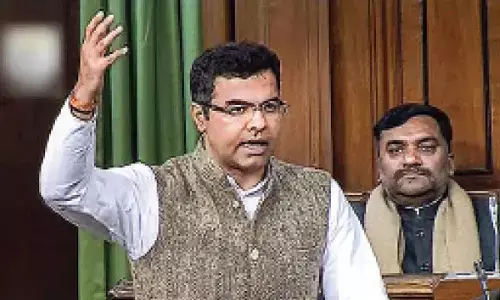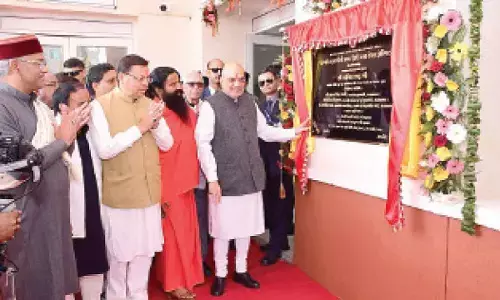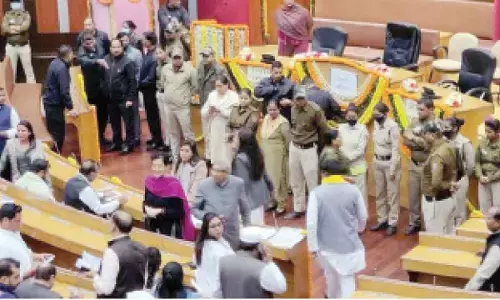Why India keeps off BRI Initiative
Share :

The concerns over China’s Belt and Road Initiative (BRI) projects grew louder after China took over Sri Lanka’s Hambantota Port on a 99-year lease as a debt swap in 2017. Several other countries, including Malaysia and even Beijing’s all-weather ally Pakistan, have expressed a wish to cut down Chinese projects over debt concerns. However, China which sees the BRI as its main plank to further its influence in the world is pressing ahead with the project amid indications that it may be downsizing the investments considering the state of its slowing down economy and demand for a number of recipient countries to restructure the debt
Beijing: For the third consecutive time, India boycotted a summit of China’s Belt and Road Initiative (BRI) which kicked off here on Tuesday, to highlight its stand on the sovereignty issues in the controversial China-Pakistan Economic Corridor (CPEC), which is being laid through the Pakistan-occupied Kashmir, and the financial viability of Beijing’s projects in smaller countries, official sources here said.
The two-day Belt and Road Forum for International Cooperation (BRFIC) is being held by China amid criticism that the loans amounting to billions of dollars for unsustainable projects turned out to be debt traps for smaller countries like Sri Lanka, driving them into a deep economic crisis. This year marks the completion of 10 years of the Belt and Road Initiative (BRI), the pet project of President Xi Jinping.
China held two international forums for its mega global infrastructure initiative in 2017 and 2019. India had stayed away from both the meetings. Official sources here said like in the previous two BRI conferences, India will not take part in this year’s meeting either. India is steadfast in its criticism of the BRI, especially its flagship the $60 billion China-Pakistan Economic Corridor (CPEC) being laid through Pakistan-occupied Kashmir (PoK) overriding New Delhi’s sovereignty concerns.
India is also vocal about its criticism that the BRI projects should be based on universally recognised international norms, good governance, and the rule of law, and follow principles of openness, transparency and financial sustainability. “The BRFIC is the most important diplomatic event hosted by China this year, and the most significant celebration for the 10th anniversary of the Belt and Road Initiative,” Chinese Vice Foreign Minister Ma Zhaoxu told state-run Xinhua news agency ahead of the conference. “So far, representatives of over 140 countries and 30-plus international organisations, including state leaders, heads of international organisations, ministerial officials and representatives of the business sector, academia and nongovernmental organisations, have confirmed their attendance,” Ma said, adding that more than 4,000 delegates have registered for participation in the event.
A number of other heads of state and governments, notably Sri Lankan President Ranil Wickremesinghe, whose country has gone bankrupt and declared sovereign default of its loans last year, have arrived here to attend the meeting. Sri Lanka has a total foreign debt of $46.9 billion, 52 per cent of which is owed to China, its largest lender. India had pitched in with about $4 billion in assistance to Sri Lanka to immediately tide over its worst economic crisis and helped the island nation to access the International Monetary Fund (IMF) bailout package. The concerns over the BRI projects grew louder after China took over Sri Lanka’s Hambantota Port on a 99-year lease as a debt swap in 2017. Several other countries, including Malaysia and even Beijing’s all-weather ally Pakistan, have expressed a wish to cut down Chinese projects over debt concerns. However, China which sees the BRI as its main plank to further its influence in the world is pressing ahead with the project amid indications that it may be downsizing the investments considering the state of its slowing down economy and demand for a number of recipient countries to restructure the debt.
Ahead of President Wickremesinghe’s arrival here, China has agreed to restructure Sri Lanka’s debt after lengthy rounds of talks. The agreement is crucial for the island nation as it is required to reach debt restructuring agreements with all its creditors to further avail of a $3 billion bailout loan from the IMF. Both Colombo and Beijing, however, are tight-lipped on the details of the debt restructuring agreement. China, which has already provided debt relief for Pakistan, also currently availing an IMF bailout, is wary of such demands from other nations that have accessed BRI loans as the Chinese economy itself is facing a downturn due to prolonged post-Covid-19 lockdowns and steady shifting of supply chains away from the country owing to Beijing’s increasing strategic conflict with the US.
Speaking at the 23rd Council of Ministers Meeting of the Indian Ocean Rim Association (IORA) on October 11 in Colombo, External Affairs Minister S Jaishankar cautioned the countries in the Indian Ocean region to be clear of the dangers of “hidden agendas” in unviable projects or unsustainable debt, in an apparent reference to China which is accused by the West of “debt trap” diplomacy. “We should be equally clear where the dangers are, be it in hidden agendas, in unviable projects, or in unsustainable debt. Exchange of experiences, sharing of best practices, greater awareness, and deeper collaboration are part of the solutions,” he said, without naming any country. Also, on the sidelines of the G20 summit this year, India launched the India-Middle East-Europe Economic Corridor comprising India, the UAE, Saudi Arabia, the European Union, France, Italy, Germany and the US.
Meanwhile, besides Wickremesinghe, several leaders of African countries who have availed the BRI loans are attending this year’s forum. The BRI has reportedly generated $240 billion in Chinese investments abroad since its inception last year. A series of landmark BRI projects such as the China-Laos Railway, the Jakarta-Bandung High-Speed Railway, and the Mombasa-Nairobi Railway, were completed and put into operation, improving the infrastructure of partner countries and significantly enhancing connectivity, according to a Xinhua report.
However, reports say that BRI is running out of steam as China has become more cautious about its investments following the economic crisis in a number of countries. Xi himself has been saying that the investment pattern of BRI will shift from mega projects to smaller ones. China will continue to carry out BRI landmark projects and focus on “small but beautiful” programmes to bring benefits to the people of all partner countries, said Cong Liang, China’s deputy head of the National Development and Reform Commission. This means, China may become more selective in the projects it pursues and will now focus on more geopolitically important countries, particularly in the Indo-Pacific region as it is locked in a strategic conflict with the US.
Chinese loans to Africa – a major focus of the BRI programme – have decreased significantly and dipped below $2 billion in 2021 and 2022, according to new data compiled by Boston University’s Global Development Policy Centre, the Hong Kong-based South China Morning Post reported. “On some level, China has added a World Bank to the developing world, and that is no small feat and very appreciated by developing countries,” according to the Centre’s director Kevin Gallagher. However, the same study noted that many recipients of Chinese loans are now struggling with their overall debts.
The BRI is here to stay – at least as long as Xi is in power since it is his signature foreign policy project and it has been elevated to constitutional status, it said. China is now increasingly financing projects with small and shorter repayment periods. According to the South African Institute of International Affairs (SAIIA), those projects are typically financed with smaller loans with short repayment windows.













